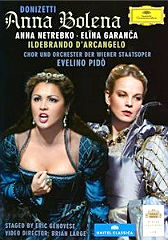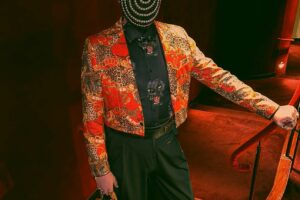
I’ve been a big fan of Donizetti’s Anna Bolena since I first heard it on recording and have always felt that it deserved a definitive recorded performance. Here’s a brief tour of why this hasn’t happened.
There’s the Bible, also known as the live Scala relay with Callas and Simionato and musical cuts so egregious to anyone who appreciates the full score it will bring them to tears. The Sills recording is complete to a fault but has a few hollow performances and a diva who overdecorates the vocal line to deflect notice of her less than majestic tone. Shirley Verrett triumphs over her as Jane Seymour every time she opens her mouth.
When I was 17 my mother had a business trip to London and I made her bring me back the Decca Elena Souliotis recording because you couldn’t buy it in the U.S.. (Yeah, I had it that bad.) This valiant effort from a little-engine-that-couldn’t diva at least offered the consolation of of the young Marilyn Horne and Nicolai Ghiaurov who are splendid.
Bolena was one of Montserrat Caballe’s favorite cancellations, but she never committed any of it to studio disc beyond the final scene. As for the late-career Joan Sutherland grotesquerie – well, she’s dead now so I can say it. 61 was way too old to take on Anna Bolena. Bonynge actually transposed phrases up for her so she could use the working and audible parts of her voice. Katia Ricciarelli made a late career stab at it as did Edita Gruberova and Carol Vaness. I don’t think any of them found it a good fit.
So we have a thoroughly wonderful opera that just hasn’t ever been performed wonderfully enough or often enough to find it’s fan base. It started Donizetti’s career and made him world famous with reason. It overflows with melody and has arguably one of the greatest Act I finales ever written for the stage.
Now, I should confess that I haven’t been a huge fan of Anna Netrebko. I appreciate the complicated timbre of her voice even though it’s a bit too dark for my taste. If you look up the word “chiaroschuro” in the dictionary there’s her picture next to it. I also appreciate how absolutely game she is, especially with wrong headed Regie stagings pushing interpretations on her that are perverse for the work at hand.
See the Salzburg Nozze di Figaro where her Susanna is having relations with the Count. I call it the Figaro of Inappropriate Touching. She was within her rights to sue for sexual harassment on that job. In the documentary to that production she doesn’t complain about the grievous errors in judgement on the director’s part exactly. She does acknowledge that it makes her work a challenge but, you can tell she’s willing to try it on.
What other soprano was ever so obviously eager to run, dance, jump and literally throw herself about the stage singing a showcase aria like the Waltz in Romeo et Juliettel, while all the time remaining in character? And let us not forget the flat on her back, head hanging into the pit, mad scene cabaletta in Puritani. She has my admiration.
I think I’ve watched all her documented performances and I’ve always considered her to be a very naturalistic and sensual performer. There have been times, however, when I’ve found her lacking in depth of feeling: the Salzburg Traviata, for example. Although her vocalism is exemplary both in its detail and freshness, there are moments in the score when she doesn’t seem to be able to let the charming sexy kitten persona fall away completely to reveal the woman’s soul underneath. It’s there in Verdi’s writing but she can’t seem to bring it across the footlights or find it in the voice to the full extent that she should.
It’s a magical thing when you see a good artist become a great one and it happens on this DVD from Vienna with Ms. Netrebko’s role debut in Anna Bolena. She practically burns down the Vienna Staatsoper from sheer force of personality alone. Her singing of this arduous part is nothing less than a righteous ownership of the role, phrase after phrase of the deepest emotion filtered through a bel canto discipline of very high order. Some of her briefest utterances become the most moving which is the great benefit of hearing a singing actress of this caliber in a role this rich.
By the time she gets to the final scene she’s shaded her fil di voce down to what sounds like silk coming off the spool. Moments later in the final cabaletta she narrows her gaze in venomous hatred and her singing becomes something almost volcanic. She doesn’t interpolate a high note ending into the finale and I am certain no one present was disappointed. She brings her entire craft to this preformance, even revealing a luscious trill on the repeat of “Al dolce guidami.”
Elina Garanca as Giovanna Seymour throws down her bel canto credentials with her first breaths on the stage, immediately dispatching messa di voce, trill and cadenza with fantastic ease on her brief entrance arioso. She’s a powerful singer in this repertory and she goes tusk to tusk with Ms. Netrebko in their Act II duet which turns into the highlight of the performance. Tragically they snip too much of her last aria but what we’re left with is enough for me.
Ildebrando D’Arcangelo is the Enrico VIII. I wanted to like his performance more because he’s working so hard at it. Unlike our ladies, who are peeling off phrase after phrase with nary a beaded brow, he’s a sweaty mess throughout. In the first act he sounds like he’s pushing too hard and we’re not hearing the core of his sound. In the second act he’s better balanced but it’s still real work. The role just seems to be one size too big. I’m calling it admirable but not inspired.
The role of Percy was apparently written for a tenor who’s voice sat just a tad higher than Francesco Meli’s. His sound is very bright and he doesn’t really warm up to his top until the second half. With all the romantic music that Donizetti blessed this character with I was hoping more for an Edgardo than an Arturo. Sadly, he seems immature and nearly graceless as an artist when Ms. Netrebko repeats his phrases back to him in their Act I duet.
For the set design by Jacques Gabel and Claire Sternberg I have only disdain. It’s a triangular hall with non-descript walls featuring common garage doors all on a revolve. It’s very dark from every angle, which actually turns out to be its only redeeming feature. On the home screen, one can ignore the ghastly set for the costumes by Lisa Spinatelli. Fashioned from relentlessly metallic and iridescent silks they are of mostly Tudor design with only vague Star Wars accents for the Tower guards.
Stage director Eric Genovese does some nice blocking and gives the ladies some good entrances and exits. Our divas do a little too much reeling about in feigned horror but it is that kind of melodrama and they’re so into it they pull it off. I want to say he pretty much scuppers the final pages of the score but once Ms. Netrebko is through singing you’re really just trying to catch your own breath.
Evelino Pidò in the pit gives us a crackling good rendition of the overture. Orchestral playing is magnificent throughout and he gets real feeling from the Vienna musicians. As to the edition, they do perform most of the aria repeats but not all. The strettas, however, have been slashed and in most cases they are sorely missed.
Everything is so well performed, though, I’m quibbling, truly. The whole performance has a real gala air about it. The audience applause at the Act I finale and after the Act II duet are so strong it’s surprising watching at home and the calls at the end go on and on. Ms. Netrebko actually makes a mad dash for a bouquet thrown during her last bow, which is charming.
Our old friend Brian Large is behind the camera and does his usual exemplary job of catching the right angle and the best reaction. DG spaces the performance over two DVD’s and sound and picture are supurb. A Blu-ray release is planned for the beginning of the year but I can’t see the point in getting a clearer view of this set. I hope the Met releases their opening night before too long because I’d love to see Ms. Netrebko with a few more performances under her belt. There are two other videos on the market of Anna Bolena but they barely register after the fire and spirit of this most excellent outing.
My only question remains… do you think “they” will they let her sing this role at La Scala?



























Comments